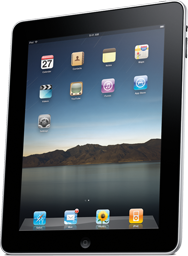Shrewd Moves: Global Supply Lockdown
February 3, 2011 Some semi-scandalous exaggeration on the part of Samsung recently, shows how desperate iPad competitors have become in their quest to dethrone the king of tablets. In short, Samsung reported it had sold 2 million Galaxy Tab devices in the last quarter. If that were the case, it's a respectable number, though nowhere near Apple's 7.3 million iPads sold in the same period. Samsung sold 2 million Galaxy Tabs to carriers and retail stores - not to actual customers. And they won't tell us how many have made it to customers' hands. This week, it was revealed that the Galaxy Tab has a 16% return rate. That's not a very good sign for the future of this 'iPad Killer.'
Some semi-scandalous exaggeration on the part of Samsung recently, shows how desperate iPad competitors have become in their quest to dethrone the king of tablets. In short, Samsung reported it had sold 2 million Galaxy Tab devices in the last quarter. If that were the case, it's a respectable number, though nowhere near Apple's 7.3 million iPads sold in the same period. Samsung sold 2 million Galaxy Tabs to carriers and retail stores - not to actual customers. And they won't tell us how many have made it to customers' hands. This week, it was revealed that the Galaxy Tab has a 16% return rate. That's not a very good sign for the future of this 'iPad Killer.'
There isn't a viable competitor to the iPad and there's likely not going to be for some time, if ever. That's right - ever.
Recall the early success of the iPod. Throngs of manufacturers tried to compete but ultimately failed to dethrone Apple's iconic music player. Many big players like Creative, exited the music player business completely. Products like the Zune from Microsoft were unable to grab any meaningful market share. iPod achieved a 75% share of the MP3 player market and has held on to that share for several years now. Even though iPod sales are down on account of a saturated market, they still sold 19 million over the holidays.
A cunning business tactic is partly responsible for the dominance of the iPod. That same tactic is now being applied to the iPad. In 2005, Apple used several billion of its cash reserves to pre-book flash memory production from Samsung, Hon Hai, Hynix and Intel. In one fell swoop, Apple bought up a massive chunk of the global supply of flash ram for several years. The result of which enabled Apple to produce mass quantities of iPods while competitors struggled to find supply. By virtue of creating a constrained supply of components, Apple also got the cheapest flash ram pricing in the world. With spotty supply and razor thin profit margins, competing with the iPod became impossible for many manufacturers.
Apple recently announced it just spent about $4b of their $60b cash reserve and pre booked 'component supply' with multiple suppliers over the next several years. What they really mean is that they've locked up the global supply of 10" IPS touch screens. It means that, just like the iPod, creating an iPad competitor will be difficult because of the supply chain. There's going to be constrained access to supply and what components can be sourced, are going to be expensive.
This is the reality that iPad competitors face for 2011. Finding 10" touch screens will become extremely difficult. What touch screens that can be sourced, are going cost way more than what Apple's paying. In the end, there's not going to be a real iPad competitor this year because manufacturers won't be able to build enough of them. In response, competing manufacturers will try to convince customers that 7" touch screens are just as good as 10" screens - that being even more portable than an iPad is a good thing.
This scenario is already starting to play out with the upcoming PlayBook from RIM. The PlayBook uses a 7" touch screen - that's only 45% of the screen real-estate of an iPad. As a business tool, I think it's going to be dead on arrival. If you can't get two hands on a touch screen, you're going to be typing with your thumbs or hunting and pecking. Two full hands on a keyboard is critical. Try writing an email as long as this article with a 7" touch screen. No thanks.
It's likely that the iPad 2 will set some new benchmarks and keep the competition playing catch up. Apple's proven it can do that with its products over and over again. At the same time, the iPad is likely the only tablet you're going to see in any quantity at your local retail store.
Locking down the global supply of touch screens is a very shrewd move on Apple's part. It shouldn't come as a surprise, though. They've done it before and now they've got more cash than god and a bigger market than the iPod ever could have been. Don't expect the iPad to face serious challenge in 2011. Apple is not only building the best tablet and supporting ecosystem (60,000 iPad apps and counting), they've also built the supply chain to match. It's a one-two punch that's given the competition a concussion in the first round.
Other posts by Chris Marriott
- Seeking Backstage Resellers
- Preemptive Multi-Talking -- Johnny and the Liquidators
- Preemptive Multi-Talking -- Pundits are the worst!
- Preemptive Multi-Talking -- WWDC 2016
- Preemptive Multi-Talking -- Of Cash Piles and Job Cuts
- Preemptive Multi-Talking -- 60 Scary Minutes Edition
- Preemptive Multi-Talking -- [R]Evolution Edition
- Preemptive Multi-Talking -- Pinocchio Edition
- Preemptive Multi-Talking -- FBI vs. Apple
- Preemptive Multi-Talking -- 1984 Edition
- Preemptive Multi-Talking -- Earnings Madness Edition
- Preemptive Multi-Talking -- All your passwords are belong to us.
- Preemptive Multi-Talking -- Fog, Fizzle, Flop Edition
- Preemptive Multi-Talking -- FUD Redux Edition
- Preemptive Multi-Talking -- Privacy be Damned Edition
